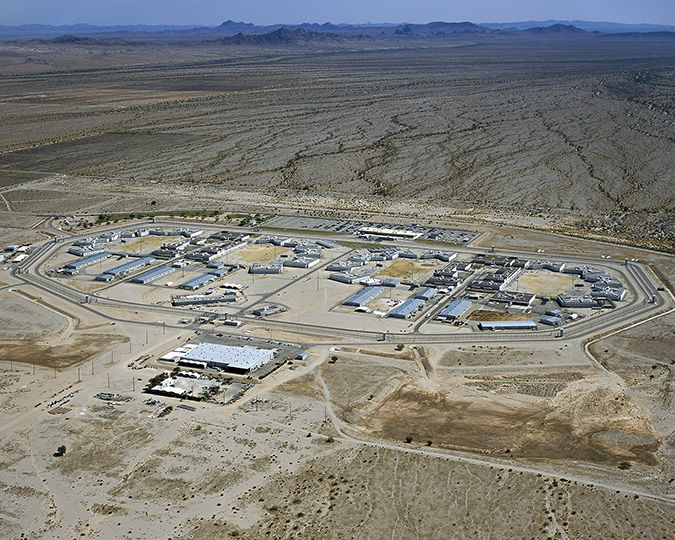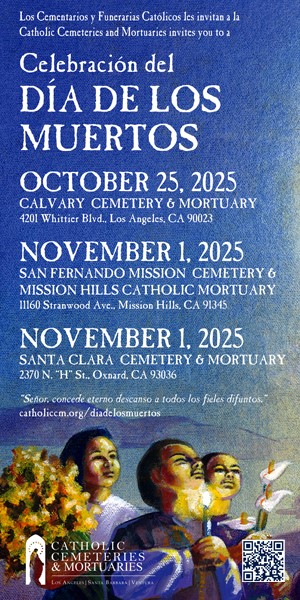Working with the incarcerated demonstrates that food is a huge, essential, gigantic factor in their lives because most of the time their taste buds are being treated with either institutional or canteen food. It also demonstrates that the technique Jesus often used, which we call “table fellowship” is still a powerful medium, even in the darkest places.
A recent event at Ironwood State Prison, a few miles east of Blythe, proved both of these concepts.
On May 10, at the Technology, Entertainment and Design (TEDx) Talks held at Ironwood State Prison, I had lunch with Floyd, an inmate who has helped the Jesuit Restorative Justice Initiative (JRJI) team coordinate the Ignatian retreats held in one of the yards in Ironwood during the last year.
TEDx is an international community that organizes TED-style events anywhere and everywhere celebrating locally-driven ideas and elevating them to a global stage on the internet, www.tedxtalks.ted.com. This was the first time one of these motivational conferences, designed for younger audiences, had been brought to a men’s detention facility. During a whole day VIPs and inmates mingled and shared similar stories of despair, forgiveness, redemption, life. But were all participants aware of such spirit?
To eat catered morsels of especially crafted delicacies with a brother in blue (prisoner) around the standard prison chow metal table at which day after day the incarcerated scarf down in five minutes the food before them was so different. It was surrealistic, emotional, symbolic, historic, connecting to closeness of sharing food.
Jesus was the master of sharing around a table. This symbolic eating together spoke loudly and clearly that at least for one day everything was different. It was a day of connection, communication. I have been holding spiritual retreats in prisons all over California for 20 years and somehow, after all the glitches, lockdowns, cancellations of programs, thick fog or high winds preventing the retreats from taking place, the TEDx Talks experience showed that with the right will it is possible to do the impossible.
The TEDx talks signaled a paradigm shift when actions show that the so-called “dangerous criminals” are also human beings. There was not one incident all day in the darkened gymnasium where the talks took place.
People who do not visit prisons very often might have failed to grasp the significance to prisoners of sharing food with people from the outside. This never happens.
During the talks, the same thing was stressed repeatedly: infinite possibilities. And as the day went on and as people spoke, it was also very clear that many of the people locked up had not closed the door to their lives. The infinite possibility of Redemption was everywhere. Jesus was present in these souls!
Inner healing
The hope articulated during the talks moved the hearts of those who had never been inside one of these concrete monsters. Some from outside spoke of their past hurts. The men in blue spoke of how this time of incarceration has been a time for inner healing.
Eileen, who works in the warden's office, took us on the journey of dealing with the unimaginable pain resulting from the loss of a son. Her son was murdered six years ago. Her journey has led her to the transcendent task of forgiving the two masked men who executed her son.
The district attorney from San Francisco spoke of the bankruptcy of the war on drugs. Following Howard Zinn and his philosophy of restorative justice, he stressed the importance of community involvement in sentencing and the importance of paying attention to the victim´s voice as well.
After being in this prison so many times, it amazed me that from one moment to the next the fine line between who was in the inside and who were on the outside suddenly disappeared. The food that we shared during the talks became a symbol of dignity. There was a sense that the men in blue were also important. The food was also for them. It was really hard for them to get used to being looked upon as human beings.
Is a TEDx Talks day going to change the culture of Ironwood prison? Obviously not. But it was a symbol of how it is possible to show that those who are locked are being healed as they deal with the harm done to the victim. They realize that they have something to give back to society.
The event ended. Floyd went back to his house at the prison. He laid down on his bunk that night. He looked around his house. Everything was the same, but at the same time everything was different.
That is what transcendence is. Nothing looks like it has changed and yet everything had changed for those in blue, who most of the time feel looked down upon as not worth much.
The daily life in prison: the numerous searches, having to watch their backs, having to live with difficult people. But on that day, just sitting around the same table sharing special food with people from the outside somehow changed what was inside of Floyd's room. There was the same sink, the same narrow slit in his window and yet everything was different. Somehow, the music in his heart was being played, voicing that he is still valued as a human being.
Isn't that what the TEDx Talks were all about? Isn't that what all our work is about — dignity? The symbol of sharing food around a circle spoke of common humanity.
The future
Human beings. Things will not change overnight at Ironwood. The Correctional Institution is a dysfunctional system that no one bothered to mention during the talks. It is easy to lose our humanity when a dysfunctional system dominates.
Without a complete paradigm shift, everything remains the same. The May 10 talks came from a revisionist philosophy. The San Francisco District Attorney got closer to the broken system when speaking about the sentencing process.
I could not help but see everything from a theological lens. Some of the speakers were fairly explicit in their analysis of how God fits into all of this, but the theme of healing was buried.
Yes, a day of talks will not change things. Tonight Floyd is looking at the ceiling of his cell, the same cell. He will put on his blues tomorrow. He and the other prisoners know that, for the most part, the moment they put on those blues they are not worth much to those overseeing them.
But on May 10, the rich and famous sat with these men in blue who paradoxically have more to teach to us than what we can teach them about dealing with our inner demons and truly moving toward inner change, shown during a simple day of TEDx talks.
Jesuit Father Michael Kennedy is the executive director of the Jesuit Restorative Justice Initiative in Culver City (www.jrji.org) and co-chaplain at Barry J. Nidorf Juvenile Hall in Sylmar.

